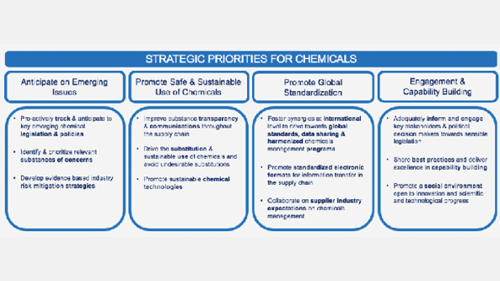Chemicals
Building a healthier and more environmentally sustainable future

The pharmaceutical sector is one of the most regulated in Europe and the world. Accordingly, the pre-approval of manufacturing plants, clinical trials and marketing authorisations should be given consideration when implementing and interpreting some elements of EU Chemicals legislation. The long development timelines and highly regulated nature of this industry are fundamental aspects of the ability to react to changes in legislation (e.g. restriction of chemicals). Chemical processes comprise a significant portion of a medicine’s environmental footprint, and responsible use of chemicals is a key environmental stewardship priority for the sector.
Our member companies lead projects and initiatives to minimize the impact of their manufacturing process, including by reducing the generation of hazardous waste, and exploring substitution for substances of concern. For instance, EFPIA member companies are partner in a recently launched call for projects to better manage emissions of PFAS and explore alternatives when possible in order to protect the environment and human health.
Due to the global operation of our companies and increasing number of countries with emerging chemical legislation, it is crucial that collaborations take place between industry and regulators globally.
EFPIA has been supportive of the European Commission's chemical strategy for sustainability the need to develop a sustainable chemicals strategy and to and is promoting research & development for the transformation of the chemical industry and the creation of green and sustainable manufacturing. For example, EFPIA member companies are collaborating closely with regulators to share data on chemicals, as part of the 'One substance, one assessment' approach and are actively building an evidence-based information system with new data through the IMI PREMIER project. Such data can be used to progress on the responsible use of medicines.
Additionally, EFPIA is supportive of the European Chemicals Industry Action Plan and all initiatives designed to support European chemical industries and to enhance their competitiveness. As downstream users of chemicals, we are deeply integrated in the chemical ecosystem and simplifying and streamlining chemical pieces of legislation will ultimately benefit our companies' capacity to innovate and timely deliver treatments to patients.
- Titanium dioxide and alternatives - Industry submission to EMA Feb 2024
- NEW: PFAS infographic
- NEW: EFPIA Report In Response The Annex XV PFAS Restriction Proposal
- NEW: Annex 1 Socio-Economic Analysis Of the potential restriction of PFAS used in the production, packaging and delivery of human medicinal products
- NEW: Annex 2 Impact of Proposed PFAS Restriction on Patient Access to Medicines & EU Strategic Autonomy
- NEW: Annex 3 Use of Fluoropolymers and Fluoro-Elastomers in Medicinal Product Manufacturing Facilities
- NEW - Report on current and proposed CLP hazard classes
- EFPIA and AnimalHealthEurope's Position on PFAS
- EFPIA Substance Regulatory Compliance Declaration for Articles
- Industry Pioneers the Contribution of Substance Data to decrease animal testing
- EFPIA response to Commission roadmap on chemicals strategy for sustainability 2020
- EFPIA Paper on Material Declaration
- EFPIA position on microplastics 2019
- Commission roadmap on chemicals strategy for sustainability
- Commission webpage microplastics